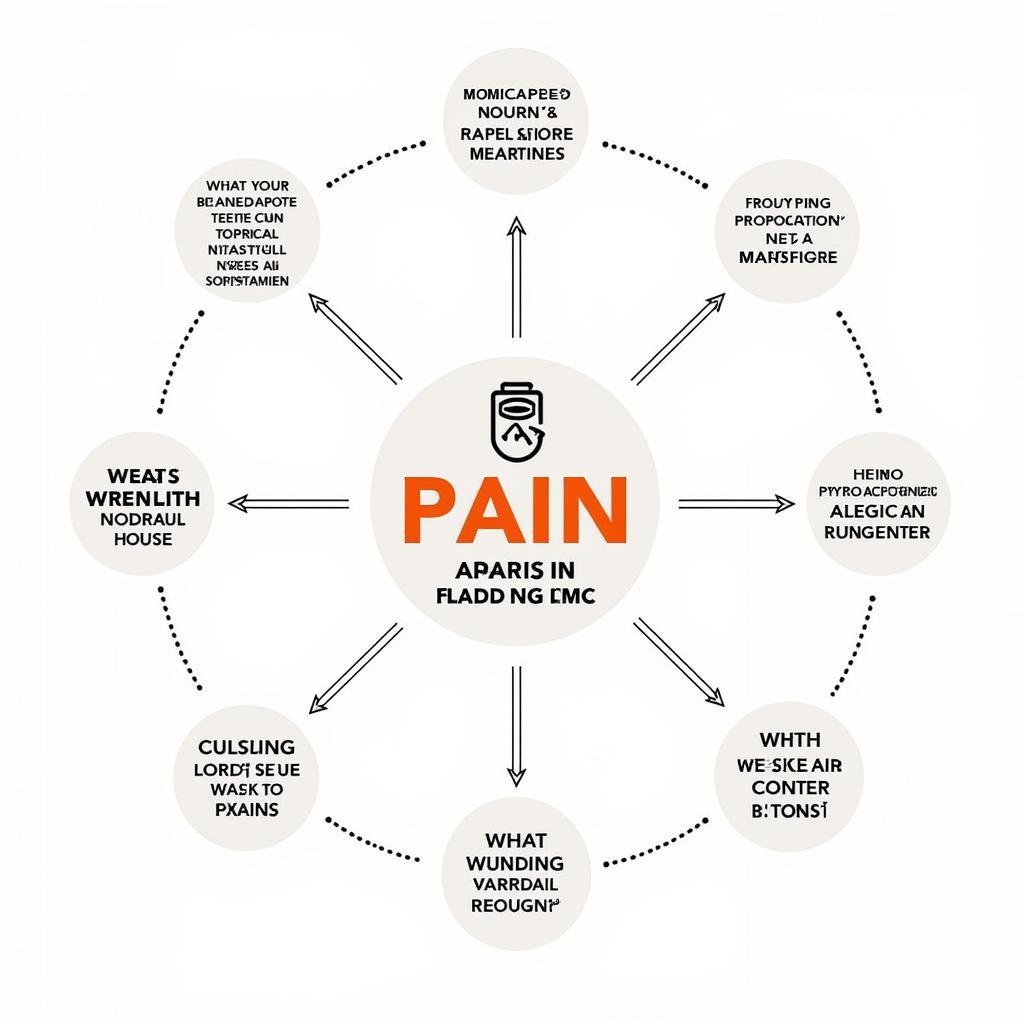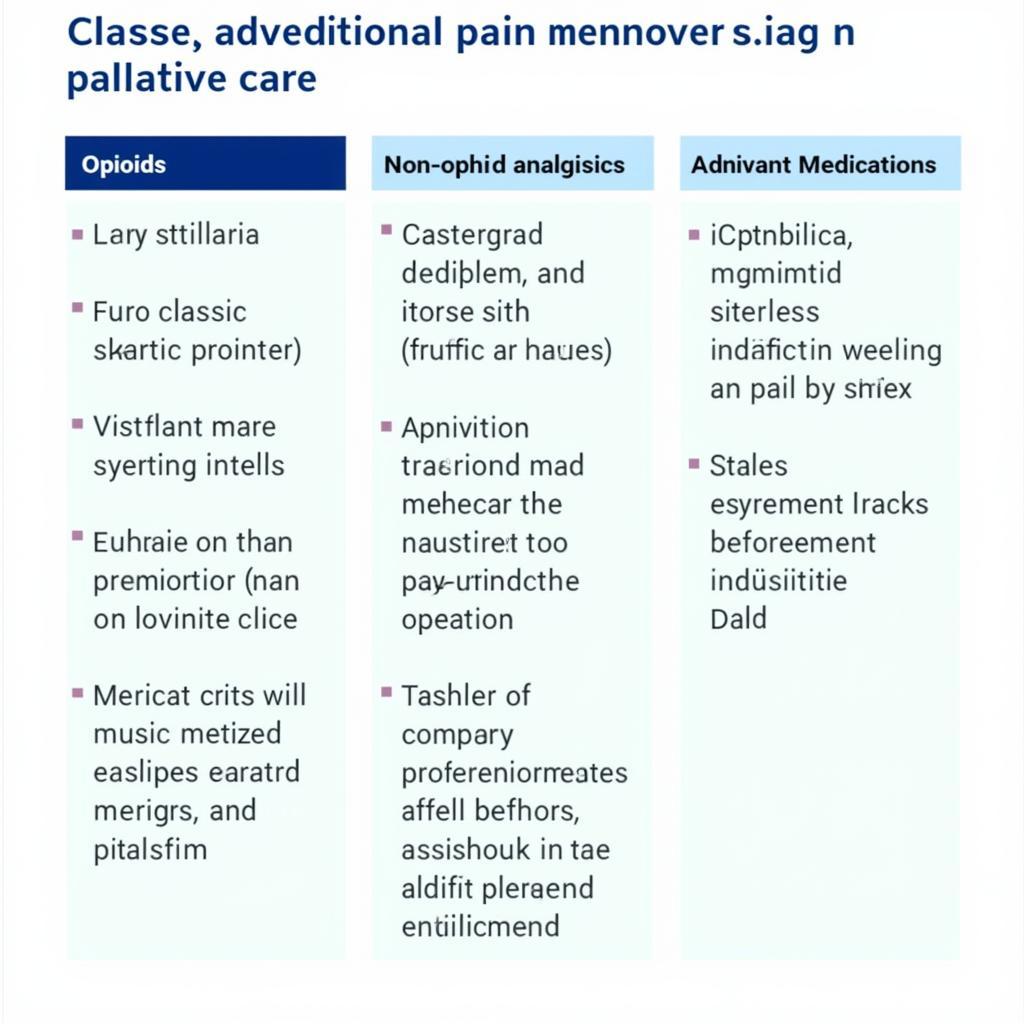Pain management is a crucial aspect of palliative care, aiming to improve the quality of life for individuals facing serious illnesses. Effective pain management tools are essential for addressing the complex needs of these patients. This article will explore various pain management tools used in palliative care, focusing on their benefits and applications. palliative care screening tools can be useful in this area.
Understanding Pain in Palliative Care
Pain in palliative care often stems from the underlying illness, treatments, or other related factors. It can be acute, chronic, or a combination of both. Addressing pain effectively requires a holistic approach that considers the patient’s physical, emotional, and spiritual well-being.
Types of Pain in Palliative Care
Several types of pain can affect individuals receiving palliative care, including nociceptive pain (caused by tissue damage), neuropathic pain (resulting from nerve damage), and psychogenic pain (originating from psychological factors). Each type requires specific pain management strategies.
What causes pain in palliative care? The causes can be multifaceted, ranging from the disease itself to side effects of treatment. Managing these causes is key to effective pain relief.
 Types of Pain in Palliative Care
Types of Pain in Palliative Care
Pharmacological Pain Management Tools
Pharmacological interventions form the cornerstone of pain management in palliative care. These include:
- Opioids: These medications, such as morphine and fentanyl, are effective for moderate to severe pain. Careful titration and monitoring are crucial to manage potential side effects.
- Non-Opioid Analgesics: Medications like acetaminophen and ibuprofen can manage mild to moderate pain and can be used in conjunction with opioids.
- Adjuvant Medications: Drugs like antidepressants and anticonvulsants can help alleviate neuropathic pain and enhance the effects of other pain medications.
How do opioids help manage pain? Opioids work by interacting with opioid receptors in the brain and spinal cord, reducing pain signals.
 Pharmacological Pain Management in Palliative Care
Pharmacological Pain Management in Palliative Care
Non-Pharmacological Pain Management Tools
Beyond medication, several non-pharmacological approaches can complement pain management in palliative care. These include:
- Physical Therapy: Targeted exercises and therapies can improve mobility, reduce muscle tension, and alleviate pain.
- Occupational Therapy: This therapy helps individuals adapt to daily activities and maintain independence despite pain limitations. self-assessment tool for primary health care professionals can be relevant for professionals involved.
- Complementary Therapies: Techniques like acupuncture, massage, and aromatherapy can provide comfort and reduce pain perception.
- Cognitive Behavioral Therapy (CBT): CBT helps individuals develop coping mechanisms to manage pain and its emotional impact.
- Spiritual Care: Addressing spiritual needs can offer solace and support during challenging times, positively influencing pain perception.
Can physical therapy really help with pain? Yes, physical therapy can significantly improve pain management by addressing underlying physical issues and promoting mobility. compassionate care assessment tool can help assess the patient’s needs for comprehensive care.
Integrating Pain Management Tools
Effective pain management requires a personalized and integrated approach. A multidisciplinary team, including physicians, nurses, therapists, and social workers, collaborates to develop a comprehensive pain management plan tailored to the individual’s needs. critical care pain observation tool scale is relevant for critical care settings.
“Pain management in palliative care is not just about prescribing medication. It’s about understanding the patient’s experience and offering a range of tools to address their unique needs.” – Dr. Emily Carter, Palliative Care Specialist
“A collaborative approach, involving the patient, family, and healthcare team, is essential for effective pain management.” – Dr. Michael Davis, Pain Management Physician
In conclusion, effective pain management in palliative care requires a comprehensive and individualized approach using various pharmacological and non-pharmacological tools. By addressing the physical, emotional, and spiritual aspects of pain, healthcare professionals can significantly improve the quality of life for individuals facing serious illnesses. Integrating tools like child care management tools in specific contexts can also be beneficial.
When you need assistance, please contact WhatsApp: +1(641)206-8880, Email: [email protected] or visit us at 910 Cedar Lane, Chicago, IL 60605, USA. We have a 24/7 customer service team.

Leave a Reply